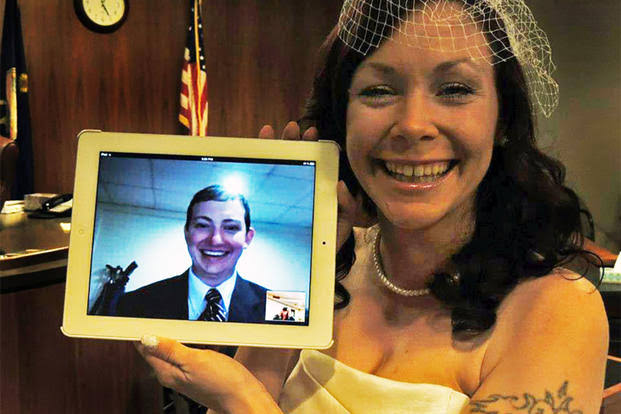Proxy Marriage: What It Is and How It Works

Hey! Glad to have you on this page as we’ll discuss what is proxy marriage and how proxy marriage works. Let’s go!
Marriage is a significant life event that traditionally involves the physical presence of both individuals to exchange vows. However, not all marriages follow this conventional route.
In certain circumstances, a type of marriage known as a “proxy marriage” allows one or both individuals to be absent during the ceremony, with a stand-in or proxy representing them.
While weddings by proxy are uncommon, they have legal standing in some places and can be a practical solution when couples face challenges that prevent them from being together for their wedding.
In this blog post, we will explore what proxy marriage is, its history, the legal requirements, the situations where it is commonly used, and the potential benefits and challenges of this unique type of marriage.
What Is Proxy Marriage?
A proxy marriage is a legal marriage ceremony in which one or both individuals are not physically present, and another person called a “proxy,” stands in on their behalf to take the vows.
This type of marriage is often used when one or both parties are unable to attend the ceremony due to circumstances such as military deployment, incarceration, immigration issues, or other significant obstacles.
There are two main types of marriages by proxy:
- Single Proxy Marriage: In a single proxy wedding, only one of the individuals is absent, and a proxy represents them. The other individual is physically present at the ceremony.
- Double Proxy Marriage: In a double proxy wedding, both individuals are absent, and proxies stand in for each of them. Double proxy marriages are extremely rare and are only legal in a few jurisdictions.
Marriages by proxy are legally recognized in some countries and regions, but the requirements and legality vary significantly depending on the location.
The History of Proxy Marriage
Proxy weddings have a long history, dating back centuries. They were often used in royal or noble families, where marriage was a matter of political alliance or property rather than personal relationships.
In these cases, the individuals getting married might never have met, and a proxy wedding allowed the union to take place without their physical presence.
In more recent times, weddings by proxy have been used in situations where individuals were separated by war, conflict, or other significant barriers.
For example, during World War II, proxy weddings became more common as soldiers deployed overseas married their fiancées back home through a proxy.
Legal Considerations for Marriage by Proxy
The legality of proxy wedding varies widely depending on the jurisdiction. In some places, proxy weddings are fully recognized, while in others, they are not legally valid.
Even within countries that allow marriage by proxy, there may be specific requirements that must be met for the marriage to be legally binding.
Key Legal Considerations:
- Jurisdiction: Proxy wedding is only legal in a few U.S. states, such as Montana, and in certain countries. It is essential to check the laws in the jurisdiction where the marriage will take place to ensure it is legally recognized.
- Consent: Both individuals must provide explicit consent for the proxy wedding, usually through a signed power of attorney or another legal document. This consent must be given willingly and without coercion.
- Documentation: The parties involved must provide all required documentation, including identification, proof of single status, and any other legal paperwork necessary for the wedding.
- Recognition: Even if a marriage by proxy is legally performed, it may not be recognized in other jurisdictions or countries. This can have implications for issues such as immigration, inheritance, or spousal rights.
Before proceeding with a wedding by proxy, it is crucial to consult with legal experts to ensure all legal requirements are met and that the marriage will be recognized in the relevant jurisdictions.
Common Situations Where Marriage by Proxy Is Used
Proxy marriages are typically used in situations where individuals face significant obstacles that prevent them from being physically present for the ceremony. Some common scenarios include:
- Military Deployment: Military personnel stationed overseas or in remote locations may use proxy marriage to marry their partner back home without taking leave. This can be particularly important for securing spousal benefits, legal status, or family rights.
- Incarceration: Individuals who are incarcerated may opt for a proxy marriage if they are unable to attend the ceremony due to their confinement. This allows them to legally marry despite their situation.
- Immigration Issues: Marriages by proxy can sometimes be used to help couples navigate complex immigration challenges. For example, if one partner is in a different country and cannot obtain a visa to travel, a proxy marriage may allow them to marry and then apply for spousal visas or other legal statuses.
- Health or Travel Barriers: In cases where one or both individuals are unable to travel due to health issues, disability, or other barriers, a proxy weather can provide a way to legally formalize their relationship.
While proxy wedding can be a practical solution in these situations, it is essential to carefully consider the legal and emotional implications before proceeding.
Benefits of Proxy Marriage</h4&gt;
Marr</p>
iage by proxy offer several potential benefits, especially for couples facing unique challenges:
- Overcoming Physical Separation:&lt;/strong> Marriage by proxy allows couples who are physically separated by circumstances beyond their control to marry and enjoy the legal and emotional benefits of marriage.
- Legal Recognition:</strong> In some cases, proxy marriage can provide legal recognition of a relationship that may be necessary for immigration, military benefits, or other legal purposes.</li></li>
- <stron
- g>F
- lexibility:</strong> Proxy marriage provides a flexible solution for couples who may be unable to wait for a traditional ceremony due to time-sensitive reasons.
Challenges and Considerations for Proxy wedding
Despite its
benefits, proxy marriage also presents several challenges and potential drawbacks:
-
- Limited Availability: Proxy weddings are only legal in certain jurisdictions, and even where they are allowed, the process can be complex and requires careful attention to legal requirements.
- Emotional Distance: The absence of one or both individuals during the marriage ceremony can make the experience less personal and emotionally fulfilling. Some couples may feel that the lack of physical presence diminishes the significance of the event.
<
li>Rec
-
- <l
<p>i style=”list-
- style-type: none;”>
-
-
- ognition Issues: E
ven if a proxy
- marriage is legally performed, it may not be recognized in other jurisdictions, which
-
can crea
-
-
- =”list-style-type: none;”>
- te c</
ul>
- =”list-style-type: none;”>
</ul
-
>
o
-
- mpli
-
- cations for legal status, spousal rights, or other issues.
- <strong>Cultural and Social Perceptions:</strong> Marriage by proxy may be viewed differently in various cultures or communities. Some people may not fully understand or accept this type of marriage, which can lead to social challenges for the couple.
-
Wrap It Up!</h4>
Proxy marr
iage or proxy weddingis a unique and legally recognized way for couples to marry when they cannot be physically present together.
While it offers a solution for overcoming significant barriers such as military deployment, incarceration, or immigration issues, it also comes with legal and emotional considerations that must be carefully weighed.
<p>Couples considering a marriage by proxy should thoroughly research the legal requirements in their jurisdiction, seek legal advice, and consider the potential challenges before moving forward.
With the right preparation and understanding, proxy wedding can be a practical and meaningful way to formalize a relationship in the face of challenging circumstances.



